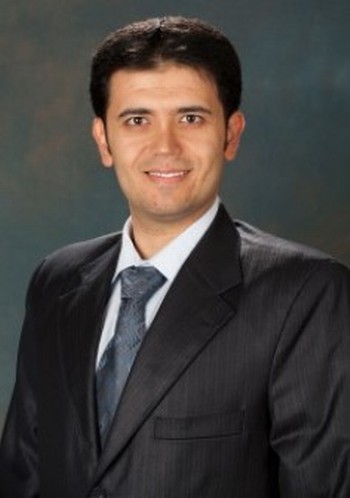MSU researcher receives USDA grant to develop improved drainage systems for farms
Ehsan Ghane, assistant professor in the MSU Department of Biosystems and Agricultural Engineering, will lead a three-year, $614,000 USDA grant to implement drainage systems that will improve water quality on farms.


Ehsan Ghane, assistant professor and Extension specialist in the Michigan State University (MSU) Department of Biosystems and Agricultural Engineering (BAE) will lead a three-year, $614,000 grant from the U.S. Department of Agriculture Natural Resources Conservation Service (USDA NRCS) to implement drainage systems that will help improve water quality on farms in Michigan and Iowa.
The goal is to create an online decision-support tool, or collection of data to help in accelerating the adoption of saturated buffers, a type of conservation drainage practice. Conservation drainage refers to any practice designed to reduce nitrate levels in a field, while still providing adequate drainage for crops to grow.
'saturated buffers reduce nitrate loss, which is a source of pollution, into surface water, Ghane said. Our decision-support tool will help improve water quality in drainage by telling a user the most cost-effective ways to reduce nitrate loss on their farm.
High nitrate levels in drainage discharge can cause hypoxia, or low levels of oxygen in water. This results in poor water quality and can potentially harm aquatic life in an ecosystem.
Pouyan Nejadhashemi, MSU Foundation Professor in BAE, is a co-investigator on the grant and will lead the development of the decision-support tool. Nejadhashemi also leads the Decision Support and Informatics unit for the MSU Global Center for Food Systems Innovation.
I am leading a group of people who will design a user-friendly online platform that integrates the saturated buffer routine, drainage model, and the nitrate removal component, he said. The tool will allow producers to better make decisions by taking both economic and environmental aspects of their design into account.
Manal H. Askar, research associate in BAE, and Babak Saravi, research specialist in BAE, are also on the project team. Other collaborators include Iowa State University, North Carolina State University, Purdue University and the Iowa Soybean Association.
We have a well-qualified team with diverse expertise to successfully accomplish our objectives, Ghane said.
Along with his team, Ghane will conduct field experiments at locations in Iowa and southeast Michigan. Data will be used to develop the decision-support tool.
'this tool will help farmers reduce more nitrate loss with (the) least amount of investment, he said.
Once the decision-support tool is ready, Ghane and his team will organize an educational workshop in Michigan, and two in Iowa, to teach farmers, watershed coordinators, drainage experts, conservation professionals, NRCS personnel and policymakers how to use it properly and effectively. They will also create online training videos and factsheets for reference as needed.
Getting involved with the practical aspect of the work is my favorite part of a project, Ghane said. It will be exciting to demonstrate how this tool can be used and why it's beneficial.
He said creating a tool to improve conservation drainage practices will help conserve natural resources and maintain productive farms.
It is important for farmers to have cost-effective solutions to protect water while growing and producing crops, Ghane said.



 Print
Print Email
Email




